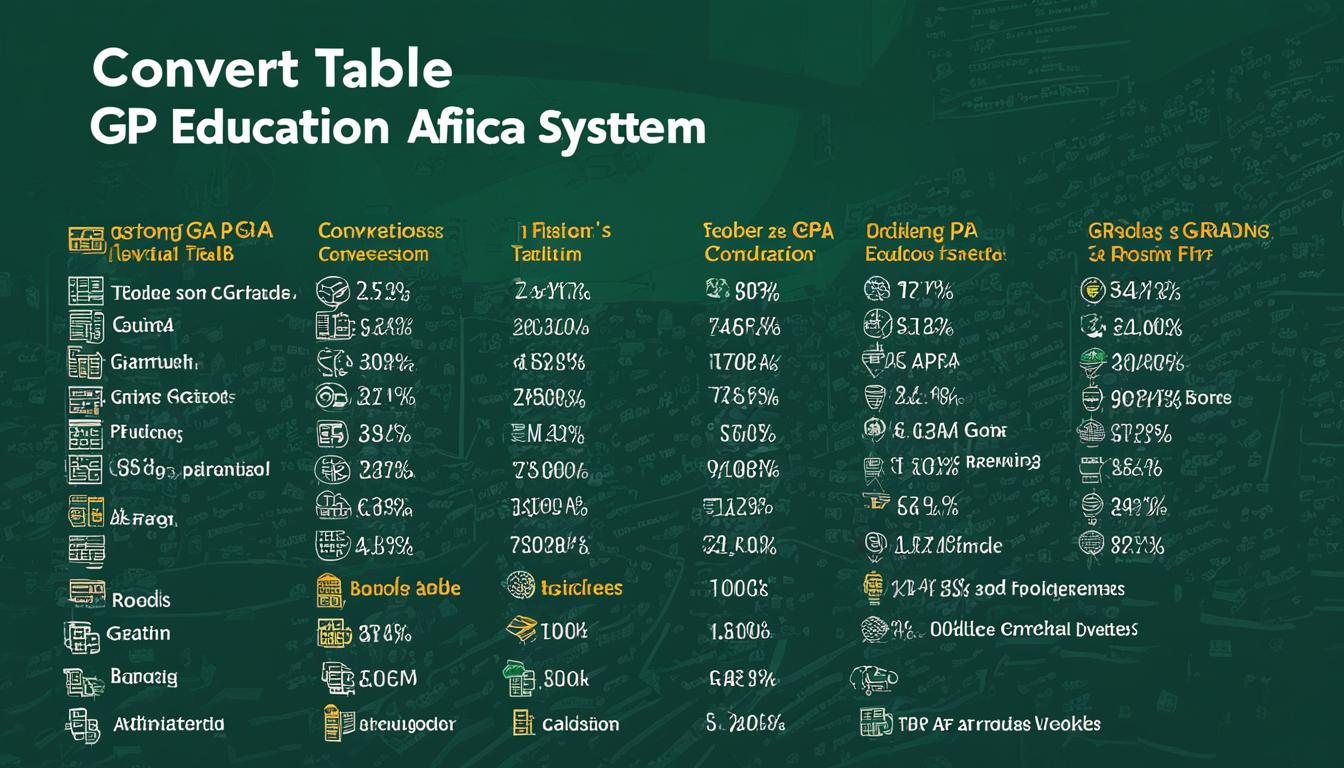South Africa Grade to GPA Conversion Guide
Converting grades can be complex, especially when dealing with different grading scales and systems. However, our guide will simplify the conversion process and equip you with the knowledge and tools necessary for accurate GPA conversion.
Understanding the South African Grading System
In South Africa, two main systems are used to provide high school marks: the National Senior Certificate (NSC), used by public schools, and the Independent Examinations Board (IEB), used by private schools.
Both systems use a similar grading scale, with letter grades corresponding to the level of achievement. To better understand the grading scale and its implications for GPA conversion, refer to the table below:
| Letter Grade | NSC Percentage | IEB Percentage |
|---|---|---|
| A+ | 90-100% | 90-100% |
| A | 80-89% | 80-89% |
| B+ | 70-79% | 70-79% |
| B | 60-69% | 60-69% |
| C+ | 50-59% | 50-59% |
| C | 40-49% | 40-49% |
| D+ | 30-39% | 30-39% |
| D | 0-29% | 0-29% |
Introduction to GPA and Its Significance in US Admissions
What is GPA?
GPA is a cumulative measure reflecting a student’s academic performance over time. Colleges and universities often use it to evaluate an applicant’s academic potential during the admissions process. A higher GPA indicates a stronger academic record, while a lower GPA may raise concerns about a student’s ability to succeed in college-level coursework.
Why US Colleges Consider GPA
US colleges consider GPA an essential factor in admissions because it provides insight into students’ academic abilities and work ethic. It helps colleges assess the level of rigor in the coursework completed by an applicant and compare them to other candidates. GPA also serves as a valuable indicator of a student’s dedication, consistency, and ability to handle the academic demands of college.
Differences Between South African Marks and US GPA
In South Africa, marks are typically based on a percentage scale, where students receive a numerical score for their performance in each subject. On the other hand, the US GPA (Grade Point Average) uses a 4.0 scale as a standardized measure of academic achievement.
Based on percentages, the South African grading scale may not directly align with the GPA scale used in the United States. This is where the conversion process becomes essential.
To convert South African marks to GPA, a specific formula calculates the equivalent GPA for each subject. This helps US admissions officers and educational institutions assess students’ academic potential and compare their performance with other applicants.
How Do I Convert My Grades to GPA in South Africa?
Converting your South African grades to GPA requires following a step-by-step process. First, gather your academic records and ensure you have all the necessary information. This includes obtaining your high school transcripts and identifying the grading scale used by your school or examination board.
Once you have gathered your academic records, you can proceed with the conversion process. The GPA conversion formula calculates your GPA based on your grades in your South African education.
The formula considers the grade values assigned to each letter grade on the South African grading scale.
🌟 Hey Students! 🚀 Ready for the ultimate experience? Join us on Studentsinside.com's Facebook, YouTube, WhatsApp, and LinkedIn. Click now for tips, fun, and success vibes! 🌈✨ #StudentLife #JoinUs
You can use a South African GPA calculator to simplify the conversion process. This online tool lets you input your grades and obtain the corresponding GPA. The South African GPA calculator automates conversion, ensuring accuracy and saving time.
Deconstructing the GPA Conversion Scale
The GPA conversion scale visually represents the relationship between letter grades and GPA points. It serves as a guide for translating your South African marks into the US GPA system. You can determine the equivalent GPA points for each letter grade using a grade conversion chart.
The table above provides a breakdown of the GPA conversion scale. It showcases how letter grades, ranging from A+ to F, correspond to specific GPA points on a 4.0 scale. For example, an A+ grade translates to 4.0 GPA points, while an A- corresponds to 3.7 GPA points. Understanding this scale allows you to convert your grades and calculate your GPA accurately.
When converting your grades to GPA, consult the conversion scale provided by your intended US colleges or universities. Some institutions may have slight variations in their GPA grading scale, so referring to their specific guidelines for accurate conversion is essential.
GPA Calculation Method for South African Students
Calculating Cumulative GPA
Calculating your cumulative GPA involves assigning a numerical value to each grade you have received and then finding the average.
Here’s a step-by-step process to help you calculate your cumulative GPA:
- Assign numerical values to each of your grades based on the GPA scale. For example, an A may be equivalent to 4.0, a B to 3.0, etc.
- Convert your grade percentages or South African marks to the corresponding GPA values.
- Calculate the total grade points by adding up the GPA values of all your grades.
- Divide the total grade points by the number of courses or subjects you have taken in high school.
Dealing with AP and Honors Courses
If you have taken Advanced Placement (AP) or Honors courses in high school, they can impact your GPA. These courses are considered more rigorous and may carry a weighted GPA value. A weighted GPA gives extra weight, usually on a scale of 4.5 or 5.0, to AP or Honors courses to signify a higher difficulty level.
When calculating your GPA, it’s essential to determine whether your school assigns weighted or unweighted GPA values to AP and Honors courses. If your school uses a weighted GPA scale, include the additional GPA points earned from these courses in your cumulative GPA calculation.
However, it’s crucial to note that each high school may have its policy regarding including AP and Honors courses in GPA calculation. Check with your school’s guidance counselor or college advisor to ensure you are following the correct method for calculating your GPA.
Documenting Your High School Performance: Reporting to US Colleges
Once you have converted your grades to GPA, it is crucial to accurately document your high school performance when applying to US colleges. Reporting your GPA accurately is essential for US colleges to evaluate your academic potential. To ensure that your application reflects your achievements effectively, here are some guidelines on reporting your GPA.
First, you must gather your academic records, including transcripts and grade reports, which provide a detailed overview of your high school performance. These documents are evidence of your academic achievements and will be required by US colleges during application.
You should accurately calculate and provide your cumulative GPA when reporting your GPA. This involves considering all your grades from grade 9 to grade 12.
To report your GPA, you should follow the formatting guidelines each college or university provides. You must convert your GPA to the 4.0 scale commonly used in the US. This conversion allows US colleges to understand your academic performance relative to their grading system and make informed admissions decisions.
It is important to note that different colleges may have specific requirements or preferences for GPA reporting. Some colleges may recalculate your GPA using their standardized scales, while others may require you to submit official documents directly from your high school.
Therefore, it is essential to thoroughly research and adhere to the guidelines provided by each institution to ensure accurate and compliant GPA reporting.
Finally, submitting all necessary documentation within the given deadlines is crucial. This includes ensuring that your GPA is accurately reported and supported by relevant transcripts and grade reports.
Submitting complete and accurate documentation demonstrates your commitment to transparency and allows US colleges to evaluate your academic achievements effectively.
International Curricula and GPA Conversion: The South African Context
IB and A Level Evaluation in the US
The International Baccalaureate (IB) and A Level programs are recognized and respected qualifications worldwide.
US universities typically consider specific subject requirements and performance in higher-level courses when evaluating IB and A-level results for admission purposes.
These international qualifications give students a strong academic background and showcase their ability to handle rigorous coursework.
Understanding CAPS Curriculum
The Curriculum and Assessment Policy Statement (CAPS) is the official national curriculum used in South African schools. CAPS aims to ensure education quality and uniformity across the country.
For South African students who have followed the CAPS curriculum, it is essential to understand how CAPS grades align with GPA conversion.
When converting CAPS grades to GPA, a conversion scale is typically used to assign GPA points to CAPS marks. The conversion scale may vary depending on the institution or evaluation service used.
South African students can consult with their school counselors or academic advisors to determine the appropriate conversion scale and ensure accurate GPA calculation.
Online tools and resources are available to simplify the GPA conversion process for international curricula. These resources can assist South African students in accurately converting their grades and calculating their GPA.
Additionally, seeking guidance from college admissions professionals knowledgeable about evaluating international qualifications can provide valuable insights and ensure accurate GPA reporting.
Strategies for Boosting Your GPA
Extracurricular Activities and GPA Enhancement
Participating in extracurricular activities can have a positive impact on your GPA. Engaging in activities such as sports, clubs, community service, or leadership positions demonstrates your commitment, dedication, and well-roundedness.
These experiences enhance your personal growth and allow you to develop valuable skills, such as time management, teamwork, and leadership, which can positively influence your academic performance.
Admissions officers often look for students who have demonstrated their ability to balance their coursework with extracurricular involvement, making it a valuable strategy for boosting your GPA.
Improving Academic Rigor Over Time
Another effective strategy for boosting your GPA is to improve your academic rigor over time. This involves challenging yourself with increasingly difficult courses as you progress through high school.
These rigorous courses provide opportunities for intellectual growth and allow you to earn higher grades and a weighted GPA. Admissions officers value students who have taken on academic challenges and have shown consistent growth in their academic performance.
Incorporating Grade 9-12 Results in Your GPA
To accurately calculate your GPA, it is essential to include grades from all four years of high school, starting from grade 9 until grade 12. Including each year’s grades in GPA calculation ensures accuracy and completeness.
This can provide valuable insight into your overall academic abilities and potential for success in higher education.
Each year’s grades contribute to your overall GPA, and including them in the calculation gives a more accurate representation of your academic achievements. Whether you had a strong start in the first year or improved throughout high school, every year’s grades play a role in determining your GPA.
Admissions officers consider the entirety of your high school performance when evaluating applicants. Including grade 9-12 results in your GPA calculation shows a complete picture of your academic journey and demonstrates your commitment to achieving excellence throughout all four years.
GPA and Athletic Scholarships: What South African Students Need to Know
South African student-athletes interested in pursuing athletic scholarships in the US should familiarize themselves with the GPA requirements set by organizations such as the NCAA and NAIA.
NCAA and NAIA GPA Requirements for Student-Athletes
The NCAA and NAIA have specific GPA requirements that student-athletes must meet to be eligible for athletic scholarships. The NCAA Division I and Division II schools have different minimum GPA requirements.
Division I schools require a minimum GPA of 2.3 in core courses, while Division II schools require a minimum GPA of 2.2. The NAIA also has its own GPA requirements, typically requiring student-athletes to maintain a GPA of 2.0 or higher.
Maximizing Scholarship Opportunities With Your GPA
A strong GPA can greatly enhance scholarship opportunities for South African student-athletes. In addition to meeting the minimum GPA requirements set by the NCAA and NAIA, a higher GPA can make a student-athlete more competitive for scholarships.
Student-athletes should prioritize their academic performance and use resources available to them, such as tutoring or academic support programs, to maintain a high GPA.
Additionally, participating in extracurricular activities that align with their chosen sport can showcase leadership skills and dedication, further enhancing their scholarship prospects.
Next Steps After GPA Conversion: Applying to US Universities
Once South African students have successfully converted their grades to GPA, the next critical stage is the college application process for US universities. Applying to US universities requires careful planning and attention to detail. Here are some essential next steps to consider:
1. Showcase your GPA effectively: In your college applications, highlight your GPA as a reflection of your academic achievements. Provide a clear and accurate representation of your GPA on your application materials, including your transcript. Admissions officers will evaluate your GPA to assess your academic potential, so make sure to present it in a way that demonstrates your strengths.
2. Understand how GPA is considered in the admissions process: US universities consider various factors during the admissions process, and GPA is one of the crucial components. Admissions officers will review your GPA and other criteria, such as standardized test scores, extracurricular activities, essays, and recommendation letters. It is essential to have a well-rounded application that showcases your academic abilities, achievements, and aspirations.
3. Research and select suitable US universities: Take the time to research and identify US universities that align with your academic and career goals. Consider factors such as location, reputation, programs of study, campus culture, and financial aid opportunities. Create a list of target universities that fit your interests and aspirations well. Choosing universities that value your GPA and offer the academic environment and resources you need to thrive is essential.
FAQ
Q: What is the South African grading system?
A: The South African grading system includes two main systems: the National Senior Certificate (NSC), used by public schools, and the Independent Examinations Board (IEB), used by private schools. Both systems use a similar grading scale with letter grades corresponding to the level of achievement.
Q: What is GPA?
A: GPA, or Grade Point Average, is a standardized measure of academic achievement in the United States. It is calculated on a 4.0 scale and is an essential factor US colleges consider in admissions.
Q: How do I convert South African grades to GPA?
A: Converting South African grades to GPA requires gathering your academic records and following a step-by-step conversion process. This involves using the GPA conversion formula and tools like the South African GPA calculator.
Q: What are the differences between South African marks and US GPA?
A: South African marks are based on a percentage scale, while US GPA is based on a 4.0 scale. Understanding these differences is essential for accurate grade conversion.
Q: How do I calculate my cumulative GPA?
A: To calculate your cumulative GPA, you must consider all your grades from grade 9 to grade 12. We will guide the GPA calculation method and how to deal with AP and Honors courses.
Q: Are there any online tools to simplify GPA conversion?
A: Yes, tools such as South African GPA calculators are available online that can help simplify the GPA conversion process.
Q: How do I report my GPA to US colleges?
A: It is essential to accurately document your high school performance and report your GPA when applying to US colleges. We will guide you on how to do this effectively.
Q: How are international curricula evaluated in the US?
A: International curricula such as the International Baccalaureate (IB) and A Levels are evaluated differently in the US. We will explain the evaluation process and guide GPA conversion for students following these curricula.
Q: What can I do to improve my GPA?
A: We will provide tips and advice on boosting your GPA, including the importance of extracurricular activities and improving academic rigor over time.
Q: Should I include grades from grade 9 to grade 12 in my GPA calculation?
A: Yes, you must include grades from all four years of high school in your GPA calculation. Each year’s grades contribute to the overall GPA.
Q: What GPA requirements do I need to meet for athletic scholarships in the US?
A: Student-athletes interested in athletic scholarships must meet GPA requirements set by organizations such as the NCAA and NAIA. We will provide an overview of these requirements and discuss ways to maximize scholarship opportunities with a strong GPA.
Q: What are the next steps after converting my GPA?
A: After converting your GPA, the following steps include applying to US universities. We will guide the college application process and how GPA is considered in admissions.








